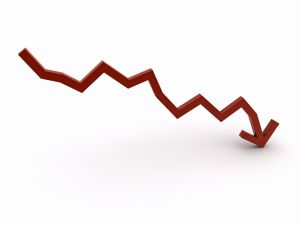The Chinese economy is much weaker than many presume according to the latest PMI data out this evening. Less than 10% of total S&P 500 profits come from China, but with Europe on the ropes and China slowing this is just one more headwind for the profits story. Here’s more via Markit:
August data signalled a renewed decline in Chinese manufacturing output, as new business decreased at the
sharpest rate in nine months. Consequently, backlogs of work fell modestly, and job shedding was recorded for the sixth month in succession. On the price front, average input costs declined at the sharpest rate in 41 months, while the rate of output price discounting remained sharp.After adjusting for seasonal factors, the HSBC Purchasing Managers’ Index™ (PMI™) – a composite indicator designed to give a single-figure snapshot of operating conditions in the manufacturing economy – posted 47.6 in August, down from 49.3 in July, signalling a tenth successive month-on-month deterioration in Chinese manufacturing sector operating conditions. Moreover, the latest index reading was the lowest since March 2009.
Commenting on the China Manufacturing PMI™ survey, Hongbin Qu, Chief Economist, China & Co-Head of Asian Economic Research at HSBC said:
“The final reading of the HSBC manufacturing PMI (August) confirmed that China’s manufacturing sector still faces intensifying downward pressure. New export orders contracted at the fastest pace since March 2009, this, combined with a record high in stocks of finished goods sub-index, and a 41-month low employment index, suggests China’s exporters are facing increasing difficulties amid stronger global headwinds. Beijing must step up policy easing to stabilize growth and foster job market conditions.”
Mr. Roche is the Founder and Chief Investment Officer of Discipline Funds.Discipline Funds is a low fee financial advisory firm with a focus on helping people be more disciplined with their finances.
He is also the author of Pragmatic Capitalism: What Every Investor Needs to Understand About Money and Finance, Understanding the Modern Monetary System and Understanding Modern Portfolio Construction.


Comments are closed.